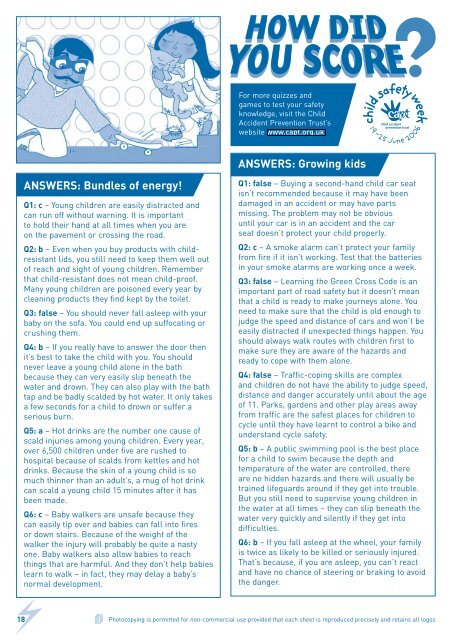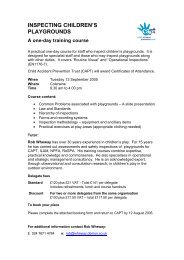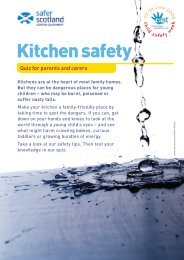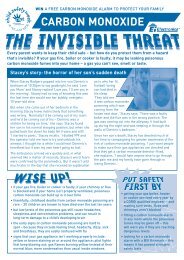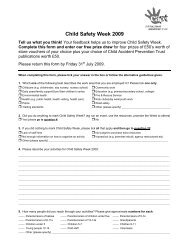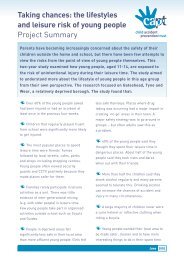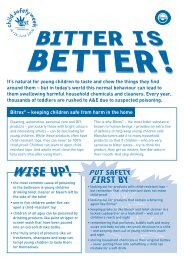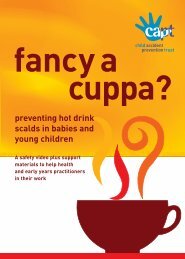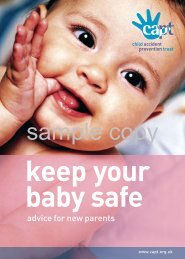Ideas booklet - Parent Directory
Ideas booklet - Parent Directory
Ideas booklet - Parent Directory
You also want an ePaper? Increase the reach of your titles
YUMPU automatically turns print PDFs into web optimized ePapers that Google loves.
For more quizzes and<br />
games to test your safety<br />
knowledge, visit the Child<br />
Accident Prevention Trust’s<br />
website www.capt.org.uk<br />
ANSWERS: Growing kids<br />
ANSWERS: Bundles of energy!<br />
Q1: c – Young children are easily distracted and<br />
can run off without warning. It is important<br />
to hold their hand at all times when you are<br />
on the pavement or crossing the road.<br />
Q2: b – Even when you buy products with childresistant<br />
lids, you still need to keep them well out<br />
of reach and sight of young children. Remember<br />
that child-resistant does not mean child-proof.<br />
Many young children are poisoned every year by<br />
cleaning products they find kept by the toilet.<br />
Q3: false – You should never fall asleep with your<br />
baby on the sofa. You could end up suffocating or<br />
crushing them.<br />
Q4: b – If you really have to answer the door then<br />
it’s best to take the child with you. You should<br />
never leave a young child alone in the bath<br />
because they can very easily slip beneath the<br />
water and drown. They can also play with the bath<br />
tap and be badly scalded by hot water. It only takes<br />
a few seconds for a child to drown or suffer a<br />
serious burn.<br />
Q5: a – Hot drinks are the number one cause of<br />
scald injuries among young children. Every year,<br />
over 6,500 children under five are rushed to<br />
hospital because of scalds from kettles and hot<br />
drinks. Because the skin of a young child is so<br />
much thinner than an adult’s, a mug of hot drink<br />
can scald a young child 15 minutes after it has<br />
been made.<br />
Q6: c – Baby walkers are unsafe because they<br />
can easily tip over and babies can fall into fires<br />
or down stairs. Because of the weight of the<br />
walker the injury will probably be quite a nasty<br />
one. Baby walkers also allow babies to reach<br />
things that are harmful. And they don’t help babies<br />
learn to walk – in fact, they may delay a baby’s<br />
normal development.<br />
Q1: false – Buying a second-hand child car seat<br />
isn’t recommended because it may have been<br />
damaged in an accident or may have parts<br />
missing. The problem may not be obvious<br />
until your car is in an accident and the car<br />
seat doesn’t protect your child properly.<br />
Q2: c – A smoke alarm can’t protect your family<br />
from fire if it isn’t working. Test that the batteries<br />
in your smoke alarms are working once a week.<br />
Q3: false – Learning the Green Cross Code is an<br />
important part of road safety but it doesn’t mean<br />
that a child is ready to make journeys alone. You<br />
need to make sure that the child is old enough to<br />
judge the speed and distance of cars and won’t be<br />
easily distracted if unexpected things happen. You<br />
should always walk routes with children first to<br />
make sure they are aware of the hazards and<br />
ready to cope with them alone.<br />
Q4: false – Traffic-coping skills are complex<br />
and children do not have the ability to judge speed,<br />
distance and danger accurately until about the age<br />
of 11. Parks, gardens and other play areas away<br />
from traffic are the safest places for children to<br />
cycle until they have learnt to control a bike and<br />
understand cycle safety.<br />
Q5: b – A public swimming pool is the best place<br />
for a child to swim because the depth and<br />
temperature of the water are controlled, there<br />
are no hidden hazards and there will usually be<br />
trained lifeguards around if they get into trouble.<br />
But you still need to supervise young children in<br />
the water at all times – they can slip beneath the<br />
water very quickly and silently if they get into<br />
difficulties.<br />
Q6: b – If you fall asleep at the wheel, your family<br />
is twice as likely to be killed or seriously injured.<br />
That’s because, if you are asleep, you can’t react<br />
and have no chance of steering or braking to avoid<br />
the danger.<br />
18 Photocopying is permitted for non-commercial use provided that each sheet is reproduced precisely and retains all logos


